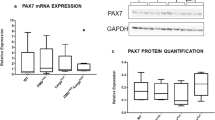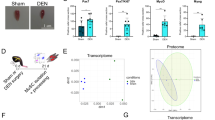Abstract
Little is known about the biological properties of myogenic satellite cells during postdenervation muscle atrophy. The present study investigated the differentiative capacity of satellite cells and their involvement in the compensatory regenerative process in long-term denervated rat muscle. Electron microscopy and immunocytochemical labeling of muscle tissue 1–18 months following denervation demonstrated that despite activation of satellite cells, myogenesis in denervated muscle is abortive and does not lead to the formation of normal muscle fibers. Small sizes, poor development of the contractile system in newly formed denervated myotubes, and the absence of satellite cells on the surface indicate that their differentiation typically does not progress to terminal stages. Many immature myotubes degenerate, and others survive but are embedded in a collagen lattice near their parent fibers. Interestingly, newly formed myotubes located on the surface of parent muscle fibers beneath the basal lamina typically did not contain developed myofibrils. This suggests that the contacts of daughter and parent muscle fibers block myofibrillogenesis. Assembly of sarcomeres in most cases occurs following complete spatial separation of daughter and parent muscle fibers. Another manifestation of the involvement of myogenic precursors in abortive myogenesis is the formation of clusters of underdeveloped branching myotubes surrounded by a common basal lamina. We found that myoblasts can also fuse directly with differentiated muscle fibers. The presence of satellite cells near the openings in the basal lamina and in the interstitial space indicates that myogenic precursors can migrate through the basal lamina and form myotubes at a distance from parent fibers. Our data may explain why long-term denervated skeletal muscle has a poor capacity for regeneration and functional restoration.










Similar content being viewed by others
References
Anderson JE, Liu L, Kardami E (1991) Distinctive patterns of basic fibroblast growth factor (bFGF) distribution in degenerating and regenerating areas of dystrophic (mdx) striated muscles. Dev Biol 147:96–109
Bischoff R (1990) Interaction between satellite cells and skeletal muscle fibers. Development 109:943-952
Bischoff R (1994) The satellite cell and muscle regeneration. In: Engel AG, Franzini-Armstrong C (eds) Myology basic and clinical. McGraw-Hill, New York, pp 97–118
Blaivas M, Carlson BM (1991) Muscle fiber branching—difference between grafts in old and young rats. Mech Ageing Dev 60:43–53
Borisov AB, Carlson BM (1997) Abortive myogenesis in denervated skeletal muscle. FASEB J 11:A420 (abstract)
Borisov AB, Carlson BM (2000) Cell death in denervated skeletal muscle is distinct from classical apoptosis. Anat Rec 258:305–318
Borisov AB, Huang S-K, Carlson BM (2000) Remodeling of the vascular bed and progressive loss of capillaries in denervated skeletal muscle. Anat Rec 258:292–304
Borisov AB, Dedkov EI, Carlson BM (2001) Interrelations of myogenic response, progressive atrophy of muscle fibers, and cell death in denervated skeletal muscle. Anat Rec 264:203–218
Carlson BM, Faulkner JA (1988) Reinnervation of long-term denervated muscle freely grafted into an innervated limb. Exp Neurol 102:50–56
Carnac G, Gurdon JB (1997) The community effect in Xenopus myogenesis is promoted by dorsalizing factors. Int J Dev Biol 41:521–524
Cossu G, Kelly R, DiDonna S, Vivarelli E, Buckingham M (1995) Myoblast differentiation during mammalian somitogenesis is dependent upon a community effect. Proc Nat Acad Sci USA 92:2254–2258
Dedkov EI, Kostrominova TY, Borisov AB, Carlson BM (2001) Reparative myogenesis in long-term denervated skeletal muscles of adult rats results in reduction of satellite cell population. Anat Rec 263:139–154
Dedkov EI, Kostrominova TY, Borisov AB, Carlson BM (2002) Resistance vessel remodeling and reparative angiogenesis in the microcirculatory bed of long-term denervated skeletal muscle. Microvasc Res 63:96–114
Dedkov EI, Borisov AB, Wernig A, Carlson BM (2003) Aging of skeletal muscle does not affect the response of satellite cells to denervation. J Histochem Cytochem 51:853–863
Gosselin LE, Brice G, Carlson B, Prakash YS, Sieck G (1994) Changes in satellite cell mitotic activity during acute period of unilateral diaphragm denervation. Am J Physiol 77:1128–1134
Gulati AK, Reddi AH, Zalewski AA (1983) Changes in the basement membrane zone components during skeletal muscle fiber degeneration and regeneration. J Cell Biol 97:957–962
Hughes SM, Blau HM (1990) Migration of myoblasts across basal lamina during skeletal muscle development. Nature 345:350–353
Irintchev A, Zeschnigk M, Starzinski-Powitz A, Wernig A (1994) Expression pattern of M-cadherin in normal, denervated, and regenerating mouse muscles. Dev Dyn 199:326–337
Larsson L, Ansved T (1995) Effects of aging on the motor unit. Prog Neurobiol 45:397–458
Lu D-X, Huang S-K, Carlson BM (1997) Electron microscopy of long-term denervated rat skeletal muscle. Anat Rec 248:355–365
Murray MA, Robbins N (1982) Cell proliferation in denervated muscle: identity and origin of dividing cells. Neuroscience 7:1823–1833
Ontell M (1974) Muscle satellite cells: a validated technique for light microscopic identification and a quantitative study of changes in their population following denervation. Anat Rec 178:211–228
Rando TA, Pavlath GK, Blau HM (1995) The fate of myoblasts following transplantation into mature muscle. Exp Cell Res 220:383–389
Reynolds ES (1963) The use of lead citrate at high pH as an electron-opaque stain in electron microscopy. J Cell Biol 17:208–213
Schmalbruch H, Al-Amood WS, Lewis DM (1991) Morphology of long-term denervated rat soleus muscle and the effect of chronic electrical stimulation. J Physiol 4441:233–241
Schmalbruch H, Lewis DM (1994) A comparison of the morphology of denervated with aneurally regenerated soleus muscle of the rat. J Mus Res Cell Motil 15:256–266
Schultz E (1978) Changes in the satellite cells of growing muscle following denervation. Anat Rec 190:299–312
Schultz E, McCormick KM (1994) Skeletal muscle satellite cells. Rev Physiol Biochem Pharmacol 123:214–257
Snow MH (1983) A quantitative ultrastructural analysis of satellite cells in denervated fast and slow skeletal muscles of the mouse. Anat Rec 207:593–604
Snow MH, Chortkoff BS (1987) Frequency of bifurcated muscle fibers in hypertrophic rat soleus muscle. Muscle Nerve 10:312–317
Standley HJ, Zorn AM, Gurdon JB (2001) eFGF and its mode of action in the community effect during Xenopus myogenesis. Development 128:1347–1357
Viguie CA, Lu D-X, Huang S-K, Rengen H, Carlson BM (1997) Quantitative study of the effects of long-term denervation on the extensor digitorum longus muscle of the rat. Anat Rec 248:346–354
Vracko R, Benditt EP (1972) Basal lamina: the scaffold for orderly cell replacement. Observation on regeneration of injured skeletal muscle fibers and capillaries. J Cell Biol 55:406–419
Watt DJ, Morgan JE, Clifford MA, Partridge TA (1987) The movement of muscle precursor cells between adjacent regenerating muscles in the mouse. Anat Embryol (Berl) 175:527–536
Acknowledgment
This work was supported by NIH grant P01-AG10821.
Author information
Authors and Affiliations
Corresponding author
Rights and permissions
About this article
Cite this article
Borisov, A.B., Dedkov, E.I. & Carlson, B.M. Abortive myogenesis in denervated skeletal muscle: differentiative properties of satellite cells, their migration, and block of terminal differentiation. Anat Embryol 209, 269–279 (2005). https://doi.org/10.1007/s00429-004-0429-7
Accepted:
Published:
Issue Date:
DOI: https://doi.org/10.1007/s00429-004-0429-7




